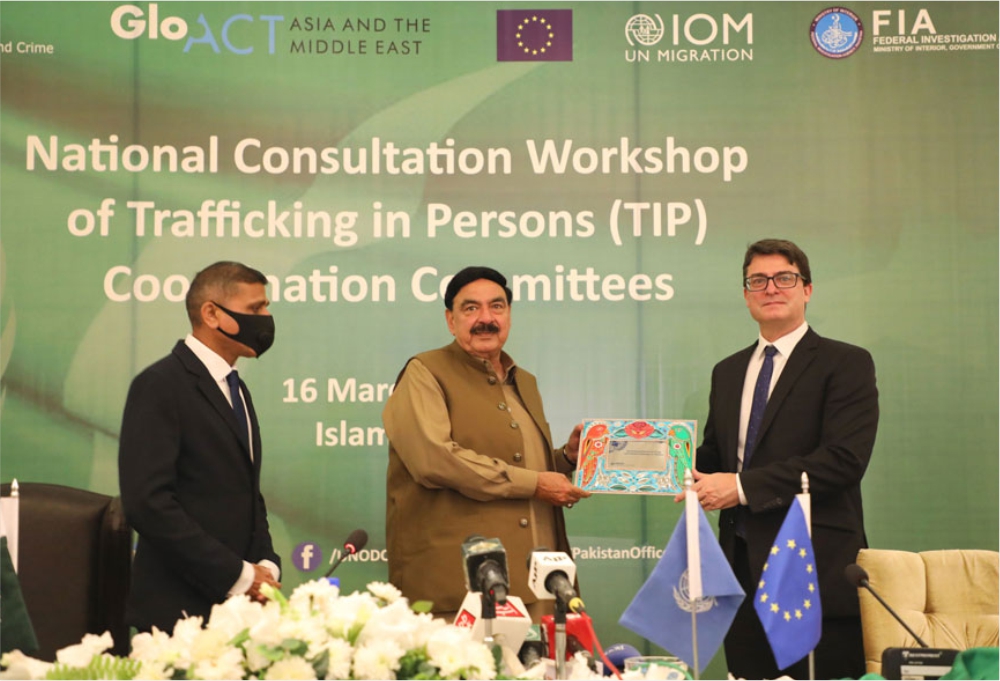
16 March 2022, Islamabad, Pakistan - UNODC, under the framework of the EU funded GLO.ACT project, for quite some time now and in collaboration with the Federal Investigation Agency (FIA), ACT project has been advocating with federal and provincial authorities to establish Trafficking in Persons (TIP) coordination committees across the country. As a result of this advocacy work, UNODC and the FIA, were able to organize on 16 March 2022 a high-level consultation workshop for provincial anti-human trafficking coordination committees.
This workshop provided a platform for all the relevant stakeholders to discuss the issues related to human trafficking. It was an opportunity for all the committee members to meet and deliberate around the objectives of these committees. During the workshop, the committee members were briefed on TIP, the enacted laws and the by-laws, and the importance of implementing robust monitoring and reporting systems.
Sheikh Rasheed Ahmed, Minister for Interior, addressing the participants, said, "Today's consultation is important for many reasons. Firstly, we need to ensure this issue remains on the national agenda and the agenda of provincial administrations. Today's discussion builds on the momentum created through the creation of the anti-human trafficking committees throughout Pakistan. Secondly, trafficking in persons is a transnational threat, which requires a transnational response. The United Nations provides a unique forum for achieving this goal".
Dr Jeremy Milsom, Representative UNODC Country Office Pakistan, in his remarks said, "Due to the multifaceted nature of human trafficking and its close connections with other transnational issues, no country is capable of combating this transnational threat on its own. This threat, therefore, requires a coordinated and meaningful response at all levels: local, regional, and international. In this regard, Pakistan has already notified the provincial-level TIP Coordination committees earlier this year. It is in the process of setting up district-level committees against TIP".
He further said, "The presence here today of senior government officials, dignitaries, law enforcement agencies, the international community, and civil society is an indication of the strong commitment and engagement of Pakistan in combating trafficking in persons and the smuggling of migrants, which I, on behalf of my agency, recognize with gratitude".
While giving his speech, the Director-General FIA, Mr Sanaullah Abbasi said, "Under the enacted laws, the police is responsible for addressing internal trafficking crime including sexual exploitation, forced prostitution, removal of organs, and forced beggary. The FIA has the mandate to curb trafficking across borders and migrant smuggling. The coordination and information sharing of all the relevant actors especially the police and the FIA is of key importance".


Emphasizing the importance of victim protection and assistance, he added, "When we identify who is most vulnerable, we can tailor our tactics and improve our strategy. When we understand what is putting communities at risk, we can improve our prevention efforts and identify ways to reach those communities to ensure that our support is victim-centered".
During her opening remarks, Ms Mio Sato, Chief of Mission, IOM Pakistan, shared that “It is critical to strengthen institutional capacity and partnerships amongst local and national stakeholders to ensure counter-trafficking efforts are sustainable and consistent. As GLO.ACT implementing partner, IOM, is pleased to see that the Government is adopting comprehensive counter-trafficking measures in line with the 2030 Agenda and the Global Compact for Migration. Setting up provincial TIP committees is just another milestone achievement that reflects the Government's commitment and resolve.”
Senior representatives of the FIA, UNODC, IOM and Chairpersons, co-chairs, and members of provincial committees--the respective Chief Secretaries, Additional chief secretaries, senior provincial police representatives, Director Generals, and senior officials of provincial prosecution, Law, Labor, Social Welfare, Child protection, and women protection departments—attended the high-level consultation. Members of civil society organizations, relevant NGOs, UNHCR, UNWOMEN, and UNICEF, also participated.
The Global Action against Trafficking in Persons and the Smuggling of Migrants – Asia and the Middle East (GLO.ACT-Asia and the Middle East) is a four-year (2018-2022), €12 million, joint initiative by the European Union (EU) and the United Nations Office on Drugs and Crime (UNODC), implemented in partnership with the International Organization for Migration (IOM) in five countries: the Islamic Republic of Afghanistan (Afghanistan), the Islamic Republic of Iran (I.R. of Iran), the Republic of Iraq (Iraq), the Islamic Republic of Pakistan (Pakistan). GLO.ACT-Bangladesh is a parallel initiative supported by the EU and IOM.
The project builds on a global community of practice set in motion in GLO.ACT 2015-2019 and assists governmental authorities and civil society organizations in targeted, innovative, and demand-driven interventions: sustaining effective strategy and policy development, legislative review and harmonization, capability development, and regional and trans-regional cooperation. The project also provides direct assistance to victims of human trafficking and vulnerable migrants through the strengthening of identification, referral, and protection mechanisms. The project is fully committed to mainstreaming Human Rights and Gender Equality considerations across all of its activities.

UNODC HQ Website:
Print Media:
Social Media
Twitter:
Facebook:
https://www.facebook.com/unodc.pakistan/posts/1301167110381488
LinkedIn:
https://www.linkedin.com/feed/update/urn:li:activity:6909778891842723840